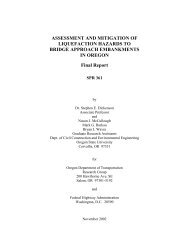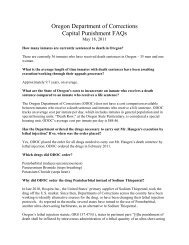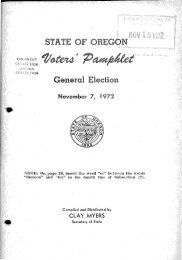- Page 1 and 2: Drug Class Review HMG-CoA Reductase
- Page 3 and 4: Final Report Update 5 Drug Effectiv
- Page 5 and 6: Final Report Update 5 Drug Effectiv
- Page 7 and 8: Final Report Update 5 Drug Effectiv
- Page 9 and 10: Final Report Update 5 Drug Effectiv
- Page 11 and 12: Final Report Update 5 Drug Effectiv
- Page 13 and 14: Final Report Update 5 Drug Effectiv
- Page 15 and 16: Final Report Update 5 Drug Effectiv
- Page 17 and 18: Final Report Update 5 Drug Effectiv
- Page 19 and 20: Final Report Update 5 Drug Effectiv
- Page 21 and 22: Final Report Update 5 Drug Effectiv
- Page 23 and 24: Final Report Update 5 Drug Effectiv
- Page 25 and 26: Final Report Update 5 Drug Effectiv
- Page 27 and 28: Final Report Update 5 Drug Effectiv
- Page 29 and 30: Final Report Update 5 Drug Effectiv
- Page 31 and 32: Final Report Update 5 Drug Effectiv
- Page 33 and 34: Final Report Update 5 Drug Effectiv
- Page 35 and 36: Final Report Update 5 Drug Effectiv
- Page 37 and 38: Final Report Update 5 Drug Effectiv
- Page 39 and 40: Final Report Update 5 Drug Effectiv
- Page 41: Final Report Update 5 Drug Effectiv
- Page 45 and 46: Final Report Update 5 Drug Effectiv
- Page 47 and 48: Final Report Update 5 Drug Effectiv
- Page 49 and 50: Final Report Update 5 Drug Effectiv
- Page 51 and 52: Final Report Update 5 Drug Effectiv
- Page 53 and 54: Final Report Update 5 Drug Effectiv
- Page 55 and 56: Final Report Update 5 Drug Effectiv
- Page 57 and 58: Final Report Update 5 Drug Effectiv
- Page 59 and 60: Final Report Update 5 Drug Effectiv
- Page 61 and 62: Final Report Update 5 Drug Effectiv
- Page 63 and 64: Final Report Update 5 Drug Effectiv
- Page 65 and 66: Final Report Update 5 Drug Effectiv
- Page 67 and 68: Final Report Update 5 Drug Effectiv
- Page 69 and 70: Final Report Update 5 Drug Effectiv
- Page 71 and 72: Final Report Update 5 Drug Effectiv
- Page 73 and 74: Final Report Update 5 Drug Effectiv
- Page 75 and 76: Final Report Update 5 Drug Effectiv
- Page 77 and 78: Final Report Update 5 Drug Effectiv
- Page 79 and 80: Final Report Update 5 Drug Effectiv
- Page 81 and 82: Final Report Update 5 Drug Effectiv
- Page 83 and 84: Final Report Update 5 Drug Effectiv
- Page 85 and 86: Final Report Update 5 Drug Effectiv
- Page 87 and 88: Final Report Update 5 Drug Effectiv
- Page 89 and 90: Final Report Update 5 Drug Effectiv
- Page 91 and 92: Final Report Update 5 Drug Effectiv
- Page 93 and 94:
Final Report Update 5 Drug Effectiv
- Page 95 and 96:
Final Report Update 5 Drug Effectiv
- Page 97 and 98:
Final Report Update 5 Drug Effectiv
- Page 99 and 100:
Final Report Update 5 Drug Effectiv
- Page 101 and 102:
Final Report Update 5 Drug Effectiv
- Page 103 and 104:
Final Report Update 5 Drug Effectiv
- Page 105 and 106:
Final Report Update 5 Drug Effectiv
- Page 107 and 108:
Final Report Update 5 Drug Effectiv
- Page 109 and 110:
Final Report Update 5 Drug Effectiv
- Page 111 and 112:
Final Report Update 5 Drug Effectiv
- Page 113 and 114:
Final Report Update 5 Drug Effectiv
- Page 115 and 116:
Final Report Update 5 Drug Effectiv
- Page 117 and 118:
Final Report Update 5 Drug Effectiv
- Page 119 and 120:
Final Report Update 5 Drug Effectiv
- Page 121 and 122:
Final Report Update 5 Drug Effectiv
- Page 123 and 124:
Final Report Update 5 Drug Effectiv
- Page 125 and 126:
Final Report Update 5 Drug Effectiv
- Page 127 and 128:
Final Report Update 5 Drug Effectiv
- Page 129 and 130:
Drug Class Review HMG-CoA Reductase
- Page 131 and 132:
Final Report Update 5 Drug Effectiv
- Page 133 and 134:
Final Report Update 5 Drug Effectiv
- Page 135 and 136:
Final Report Update 5 Drug Effectiv
- Page 137 and 138:
Final Report Update 5 Drug Effectiv
- Page 139 and 140:
Final Report Update 5 Drug Effectiv
- Page 141 and 142:
Final Report Update 5 Drug Effectiv
- Page 143 and 144:
Final Report Update 5 Drug Effectiv
- Page 145 and 146:
Final Report Update 5 Drug Effectiv
- Page 147 and 148:
Final Report Update 5 Drug Effectiv
- Page 149 and 150:
Final Report Update 5 Drug Effectiv
- Page 151 and 152:
Final Report Update 5 Drug Effectiv
- Page 153 and 154:
Final Report Update 5 Drug Effectiv
- Page 155 and 156:
Final Report Update 5 Drug Effectiv
- Page 157 and 158:
Final Report Update 5 Drug Effectiv
- Page 159 and 160:
Final Report Update 5 Drug Effectiv
- Page 161 and 162:
Final Report Update 5 Drug Effectiv
- Page 163 and 164:
Final Report Update 5 Drug Effectiv
- Page 165 and 166:
Final Report Update 5 Drug Effectiv
- Page 167 and 168:
Final Report Update 5 Drug Effectiv
- Page 169 and 170:
Final Report Update 5 Drug Effectiv
- Page 171 and 172:
Final Report Update 5 Drug Effectiv
- Page 173 and 174:
Final Report Update 5 Drug Effectiv
- Page 175 and 176:
Final Report Update 5 Drug Effectiv
- Page 177 and 178:
Final Report Update 5 Drug Effectiv
- Page 179 and 180:
Final Report Update 5 Drug Effectiv
- Page 181 and 182:
Final Report Update 5 Drug Effectiv
- Page 183 and 184:
Final Report Update 5 Drug Effectiv
- Page 185 and 186:
Final Report Update 5 Drug Effectiv
- Page 187 and 188:
Final Report Update 5 Drug Effectiv
- Page 189 and 190:
Final Report Update 5 Drug Effectiv
- Page 191 and 192:
Final Report Update 5 Drug Effectiv
- Page 193 and 194:
Final Report Update 5 Drug Effectiv
- Page 195 and 196:
Final Report Update 5 Drug Effectiv
- Page 197 and 198:
Final Report Update 5 Drug Effectiv
- Page 199 and 200:
Final Report Update 5 Drug Effectiv
- Page 201 and 202:
Final Report Update 5 Drug Effectiv
- Page 203 and 204:
Final Report Update 5 Drug Effectiv
- Page 205 and 206:
Final Report Update 5 Drug Effectiv
- Page 207 and 208:
Final Report Update 5 Drug Effectiv
- Page 209 and 210:
Final Report Update 5 Drug Effectiv
- Page 211 and 212:
Final Report Update 5 Drug Effectiv
- Page 213 and 214:
Final Report Update 5 Drug Effectiv
- Page 215 and 216:
Final Report Update 5 Drug Effectiv
- Page 217 and 218:
Final Report Update 5 Drug Effectiv
- Page 219 and 220:
Final Report Update 5 Drug Effectiv
- Page 221 and 222:
Final Report Update 5 Drug Effectiv
- Page 223 and 224:
Final Report Update 5 Drug Effectiv
- Page 225 and 226:
Final Report Update 5 Drug Effectiv
- Page 227 and 228:
Final Report Update 5 Drug Effectiv
- Page 229 and 230:
Final Report Update 5 Drug Effectiv
- Page 231 and 232:
Final Report Update 5 Drug Effectiv
- Page 233 and 234:
Final Report Update 5 Drug Effectiv
- Page 235 and 236:
Final Report Update 5 Drug Effectiv
- Page 237 and 238:
Final Report Update 5 Drug Effectiv
- Page 239 and 240:
Final Report Update 5 Drug Effectiv
- Page 241 and 242:
Final Report Update 5 Drug Effectiv
- Page 243 and 244:
Final Report Update 5 Drug Effectiv
- Page 245 and 246:
Final Report Update 5 Drug Effectiv
- Page 247 and 248:
Final Report Update 5 Drug Effectiv
- Page 249 and 250:
Final Report Update 5 Drug Effectiv
- Page 251 and 252:
Final Report Update 5 Drug Effectiv
- Page 253 and 254:
Final Report Update 5 Drug Effectiv
- Page 255 and 256:
Final Report Update 5 Drug Effectiv
- Page 257 and 258:
Final Report Update 5 Drug Effectiv
- Page 259 and 260:
Final Report Update 5 Drug Effectiv
- Page 261 and 262:
Final Report Update 5 Drug Effectiv
- Page 263 and 264:
Final Report Update 5 Drug Effectiv
- Page 265 and 266:
Final Report Update 5 Drug Effectiv
- Page 267 and 268:
Final Report Update 5 Drug Effectiv
- Page 269 and 270:
Final Report Update 5 Drug Effectiv
- Page 271 and 272:
Final Report Update 5 Drug Effectiv
- Page 273 and 274:
Final Report Update 5 Drug Effectiv
- Page 275 and 276:
Final Report Update 5 Drug Effectiv
- Page 277 and 278:
Final Report Update 5 Drug Effectiv
- Page 279 and 280:
Final Report Update 5 Drug Effectiv
- Page 281 and 282:
Final Report Update 5 Drug Effectiv
- Page 283 and 284:
Final Report Update 5 Drug Effectiv
- Page 285 and 286:
Final Report Update 5 Drug Effectiv
- Page 287 and 288:
Final Report Update 5 Drug Effectiv
- Page 289 and 290:
Final Report Update 5 Drug Effectiv
- Page 291 and 292:
Final Report Update 5 Drug Effectiv
- Page 293 and 294:
Final Report Update 5 Drug Effectiv
- Page 295 and 296:
Final Report Update 5 Drug Effectiv
- Page 297 and 298:
Final Report Update 5 Drug Effectiv
- Page 299 and 300:
Final Report Update 5 Drug Effectiv
- Page 301 and 302:
Final Report Update 5 Drug Effectiv
- Page 303 and 304:
Final Report Update 5 Drug Effectiv
- Page 305 and 306:
Final Report Update 5 Drug Effectiv
- Page 307 and 308:
Final Report Update 5 Drug Effectiv
- Page 309 and 310:
Final Report Update 5 Drug Effectiv
- Page 311 and 312:
Final Report Update 5 Drug Effectiv
- Page 313 and 314:
Final Report Update 5 Drug Effectiv
- Page 315 and 316:
Final Report Update 5 Drug Effectiv
- Page 317 and 318:
Final Report Update 5 Drug Effectiv
- Page 319 and 320:
Final Report Update 5 Drug Effectiv
- Page 321 and 322:
Final Report Update 5 Drug Effectiv
- Page 323 and 324:
Final Report Update 5 Drug Effectiv
- Page 325 and 326:
Final Report Update 5 Drug Effectiv
- Page 327 and 328:
Final Report Update 5 Drug Effectiv
- Page 329 and 330:
Final Report Update 5 Drug Effectiv
- Page 331 and 332:
Final Report Update 5 Drug Effectiv
- Page 333 and 334:
Final Report Update 5 Drug Effectiv
- Page 335 and 336:
Final Report Update 5 Drug Effectiv
- Page 337 and 338:
Final Report Update 5 Drug Effectiv
- Page 339 and 340:
Final Report Update 5 Drug Effectiv
- Page 341 and 342:
Final Report Update 5 Drug Effectiv
- Page 343 and 344:
Final Report Update 5 Drug Effectiv
- Page 345 and 346:
Final Report Update 5 Drug Effectiv
- Page 347 and 348:
Final Report Update 5 Drug Effectiv
- Page 349 and 350:
Final Report Update 5 Drug Effectiv
- Page 351 and 352:
Final Report Update 5 Drug Effectiv
- Page 353 and 354:
Final Report Update 5 Drug Effectiv
- Page 355 and 356:
Final Report Update 5 Drug Effectiv
- Page 357 and 358:
Final Report Update 5 Drug Effectiv
- Page 359 and 360:
Final Report Update 5 Drug Effectiv
- Page 361 and 362:
Final Report Update 5 Drug Effectiv
- Page 363 and 364:
Final Report Update 5 Drug Effectiv
- Page 365 and 366:
Final Report Update 5 Drug Effectiv
- Page 367 and 368:
Final Report Update 5 Drug Effectiv
- Page 369 and 370:
Final Report Update 5 Drug Effectiv
- Page 371 and 372:
Final Report Update 5 Drug Effectiv
- Page 373 and 374:
Final Report Update 5 Drug Effectiv
- Page 375 and 376:
Final Report Update 5 Drug Effectiv
- Page 377 and 378:
Final Report Update 5 Drug Effectiv
- Page 379 and 380:
Final Report Update 5 Drug Effectiv
- Page 381 and 382:
Final Report Update 5 Drug Effectiv
- Page 383 and 384:
Final Report Update 5 Drug Effectiv
- Page 385 and 386:
Final Report Update 5 Drug Effectiv
- Page 387 and 388:
Final Report Update 5 Drug Effectiv
- Page 389 and 390:
Final Report Update 5 Drug Effectiv
- Page 391 and 392:
Final Report Update 5 Drug Effectiv
- Page 393 and 394:
Final Report Update 5 Drug Effectiv
- Page 395 and 396:
Final Report Update 5 Drug Effectiv
- Page 397 and 398:
Final Report Update 5 Drug Effectiv
- Page 399 and 400:
Final Report Update 5 Drug Effectiv
- Page 401 and 402:
Final Report Update 5 Drug Effectiv
- Page 403 and 404:
Final Report Update 5 Drug Effectiv
- Page 405 and 406:
Final Report Update 5 Drug Effectiv
- Page 407 and 408:
Final Report Update 5 Drug Effectiv
- Page 409 and 410:
Final Report Update 5 Drug Effectiv
- Page 411 and 412:
Final Report Update 5 Drug Effectiv
- Page 413 and 414:
Final Report Update 5 Drug Effectiv
- Page 415 and 416:
Final Report Update 5 Drug Effectiv
- Page 417 and 418:
Final Report Update 5 Drug Effectiv
- Page 419 and 420:
Final Report Update 5 Drug Effectiv
- Page 421 and 422:
Final Report Update 5 Drug Effectiv
- Page 423 and 424:
Final Report Update 5 Drug Effectiv
- Page 425 and 426:
Final Report Update 5 Drug Effectiv
- Page 427 and 428:
Final Report Update 5 Drug Effectiv
- Page 429 and 430:
Final Report Update 5 Drug Effectiv
- Page 431 and 432:
Final Report Update 5 Drug Effectiv
- Page 433 and 434:
Final Report Update 5 Drug Effectiv
- Page 435 and 436:
Final Report Update 5 Drug Effectiv
- Page 437 and 438:
Final Report Update 5 Drug Effectiv
- Page 439 and 440:
Final Report Update 5 Drug Effectiv
- Page 441 and 442:
Final Report Update 5 Drug Effectiv
- Page 443 and 444:
Final Report Update 5 Drug Effectiv
- Page 445 and 446:
Final Report Update 5 Drug Effectiv
- Page 447 and 448:
Final Report Update 5 Drug Effectiv
- Page 449 and 450:
Final Report Update 5 Drug Effectiv
- Page 451 and 452:
Final Report Update 5 Drug Effectiv
- Page 453 and 454:
Final Report Update 5 Drug Effectiv
- Page 455 and 456:
Final Report Update 5 Drug Effectiv
- Page 457 and 458:
Final Report Update 5 Drug Effectiv
- Page 459 and 460:
Final Report Update 5 Drug Effectiv
- Page 461 and 462:
Final Report Update 5 Drug Effectiv
- Page 463 and 464:
Final Report Update 5 Drug Effectiv
- Page 465 and 466:
Final Report Update 5 Drug Effectiv
- Page 467 and 468:
Final Report Update 5 Drug Effectiv
- Page 469 and 470:
Final Report Update 5 Drug Effectiv
- Page 471 and 472:
Final Report Update 5 Drug Effectiv
- Page 473 and 474:
Final Report Update 5 Drug Effectiv
- Page 475 and 476:
Final Report Update 5 Drug Effectiv
- Page 477 and 478:
Final Report Update 5 Drug Effectiv
- Page 479 and 480:
Final Report Update 5 Drug Effectiv
- Page 481 and 482:
Final Report Update 5 Drug Effectiv
- Page 483 and 484:
Final Report Update 5 Drug Effectiv
- Page 485 and 486:
Final Report Update 5 Drug Effectiv
- Page 487 and 488:
Final Report Update 5 Drug Effectiv
- Page 489 and 490:
Final Report Update 5 Drug Effectiv
- Page 491 and 492:
Final Report Update 5 Drug Effectiv
- Page 493 and 494:
Final Report Update 5 Drug Effectiv
- Page 495 and 496:
Final Report Update 5 Drug Effectiv
- Page 497 and 498:
Final Report Update 5 Drug Effectiv
- Page 499 and 500:
Final Report Update 5 Drug Effectiv
- Page 501 and 502:
Final Report Update 5 Drug Effectiv
- Page 503 and 504:
Final Report Update 5 Drug Effectiv
- Page 505 and 506:
Final Report Update 5 Drug Effectiv
- Page 507 and 508:
Final Report Update 5 Drug Effectiv
- Page 509 and 510:
Final Report Update 5 Drug Effectiv
- Page 511 and 512:
Final Report Update 5 Drug Effectiv
- Page 513 and 514:
Final Report Update 5 Drug Effectiv
- Page 515 and 516:
Final Report Update 5 Drug Effectiv
- Page 517 and 518:
Final Report Update 5 Drug Effectiv
- Page 519 and 520:
Final Report Update 5 Drug Effectiv
- Page 521 and 522:
Final Report Update 5 Drug Effectiv
- Page 523:
Final Report Update 5 Drug Effectiv

















